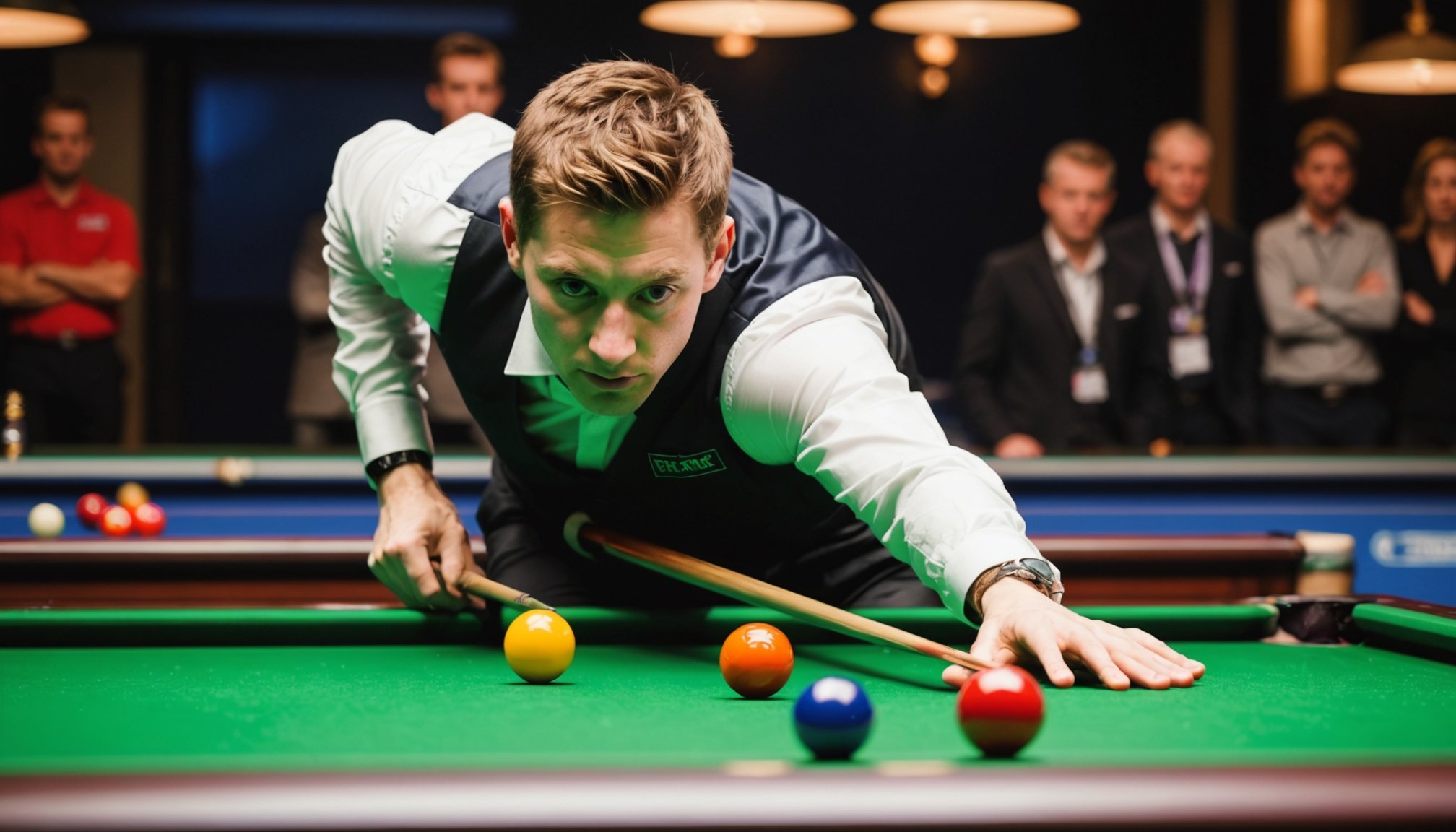Unlocking Performance: The Benefits of Integrating Sports Psychology in Training for UK Snooker Players
The Evolution of Sports and the Role of Psychology
Sports have come a long way from their origins in medieval tournaments and Renaissance-era recreational activities. As outlined in the history of sports, the transition from violent and military training to recreational and leisure activities marked a significant shift, especially during the Renaissance. Educators and medical surgeons began promoting sports for their physical and psychological benefits, laying the groundwork for the modern sports landscape[1].
In the context of UK snooker, a sport that requires precision, focus, and mental resilience, integrating sports psychology into training is not just beneficial but essential. Sports psychology experts have long recognized the impact of mental factors on athletic performance, and this is particularly true for individual sports like snooker.
Also read : Transforming indoor air quality: effective solutions for sports facilities in the uk
Understanding Sports Psychology
Sports psychology is the study of the psychological factors that influence participation in sports and physical activity. It encompasses a wide range of topics, including motivation, anxiety, confidence, and team dynamics. For snooker players, understanding these psychological aspects can be the difference between a good game and a great one.
Key Components of Sports Psychology
- Motivation: What drives an athlete to perform at their best? Understanding intrinsic and extrinsic motivators can help coaches and players tailor their approach to maximize performance.
- Anxiety and Pressure: Managing stress and pressure is crucial in high-stakes competitions. Techniques such as deep breathing, visualization, and positive self-talk can help athletes stay focused.
- Confidence: Building and maintaining confidence is vital. Sports psychologists use various methods, including positive reinforcement and mental imagery, to enhance an athlete’s self-belief.
- Team Dynamics: Although snooker is an individual sport, understanding how to interact with coaches, teammates, and even opponents can provide valuable insights into performance enhancement.
The Impact of Mental Toughness on Snooker Performance
Mental toughness is a critical component of sports psychology that refers to the ability of an athlete to perform at their best despite adversity. For snooker players, mental toughness can mean the difference between winning and losing.
Also read : Ultimate recovery techniques for uk marathon runners: proven cool-down methods to enhance post-race recovery
Building Mental Resilience
- Visualization Techniques: Visualizing success can significantly enhance performance. Snooker players can use mental imagery to rehearse shots, manage pressure, and build confidence.
- Example: A player might visualize themselves making a difficult shot, feeling the cue stick in their hand, and seeing the ball go into the pocket.
- Positive Self-Talk: Encouraging positive self-talk can help players stay focused and motivated. Coaches and psychologists can work with players to develop positive affirmations.
- Example: “I am capable of making this shot,” or “I have practiced this and I can do it.”
- Emotional Regulation: Learning to manage emotions during high-pressure situations is essential. Techniques such as mindfulness and deep breathing can help players stay calm.
Practical Insights and Actionable Advice
Integrating Sports Psychology into Training Sessions
To fully benefit from sports psychology, it needs to be integrated into the training regimen. Here are some practical steps:
- Pre-Game Preparation: Use visualization techniques and positive self-talk to prepare for matches.
- Example: Before a big match, a player might spend 10 minutes visualizing their shots and repeating positive affirmations.
- In-Game Strategies: Develop strategies to manage pressure during the game.
- Example: Taking deep breaths between shots or using a pre-shot routine to stay focused.
- Post-Game Analysis: Analyze performance to identify areas for improvement.
- Example: Reviewing game footage to see where mental lapses occurred and how to improve next time.
Working with Sports Psychologists
Sports psychologists can provide valuable insights and tailored strategies for individual players.
- One-on-One Sessions: Regular sessions with a sports psychologist can help players address specific mental challenges.
- Example: A player struggling with anxiety might work with a psychologist to develop coping mechanisms.
- Group Workshops: Team or group workshops can focus on building mental toughness and team dynamics.
- Example: A workshop on visualization techniques or emotional regulation can benefit multiple players at once.
The Role of Genetics and Physical Training
While sports psychology focuses on the mental aspects, it is also important to consider the physical and genetic factors that influence performance.
Genetic Factors
Research has shown that genetic variations can influence athletic performance and injury susceptibility. For example, studies have found that certain genetic polymorphisms are associated with muscle injuries in elite football players, which could also be relevant for snooker players who may experience repetitive strain injuries[2].
Physical Training
Hard work and dedicated physical training are essential for any athlete. However, for snooker players, the physical demands are different from those in high-impact sports. Focus on maintaining flexibility, hand-eye coordination, and overall physical health is crucial.
Case Studies and Success Stories
Ronnie O’Sullivan: A Case Study in Mental Resilience
Ronnie O’Sullivan, one of the most successful snooker players of all time, is a prime example of how mental toughness and sports psychology can contribute to success. O’Sullivan has spoken publicly about his struggles with mental health and how he has used various psychological techniques to manage his game.
- Quote: “I’ve always believed that the mental side of the game is just as important as the physical side. If you’re not right mentally, you’re not going to perform at your best.”
Table: Comparing Traditional Training with Integrated Sports Psychology
| Aspect | Traditional Training | Integrated Sports Psychology |
|---|---|---|
| Focus | Primarily on physical skills and technique | Includes both physical skills and mental preparation |
| Motivation | Often intrinsic or extrinsic motivators without specific psychological support | Uses motivational theories and techniques to enhance performance |
| Pressure Management | Limited strategies for managing pressure | Incorporates techniques like visualization, deep breathing, and positive self-talk |
| Confidence Building | May rely on natural confidence or basic positive reinforcement | Uses structured methods like mental imagery and positive affirmations |
| Injury Prevention | Focuses on physical conditioning and injury prevention | Considers genetic factors and psychological stress management to prevent injuries |
| Long-Term Success | May lead to burnout or mental fatigue over time | Aims for sustainable performance and mental well-being over the long term |
Joining the Dots: How Students and Young Athletes Can Benefit
For young athletes and students interested in snooker, integrating sports psychology into their training can be a game-changer.
University and Club Programs
Many universities and sports clubs now offer programs that combine physical training with sports psychology. These programs provide young athletes with the tools they need to succeed both on and off the table.
- Example: A university snooker club might offer workshops on mental toughness, visualization techniques, and emotional regulation.
Social Benefits
Joining a snooker club or team can also provide social benefits, helping young athletes build relationships and learn valuable life skills.
- Team Dynamics: Being part of a team can enhance mental toughness and provide a supportive environment.
- Example: Team members can support each other during competitions, providing encouragement and motivation.: Unlocking Peak Performance
Integrating sports psychology into the training regimen of UK snooker players is a powerful way to unlock peak performance. By focusing on mental toughness, visualization techniques, and emotional regulation, players can gain valuable insights into how to perform at their best.
Final Thoughts
- Quote from a Sports Psychologist: “Sports psychology is not just about fixing problems; it’s about enhancing performance and helping athletes reach their full potential.”
For snooker players, whether they are seasoned professionals or young athletes just starting out, the benefits of sports psychology are clear. By combining hard work, physical training, and mental preparation, players can achieve success and maintain high performance over the long term.
References
[1] Wikipedia: History of sport
[2] MDPI: The Genetic Basis of Non-Contact Soft Tissue Injuries
[3] Amazon S3: Implications for mental toughness research
[4] Tandfonline: Analysis of patterns and trends in competition manipulation in sport
[5] Academic.oup.com: Hiring intentions at the intersection of gender, parenthood, and social status
This article aims to provide a comprehensive and engaging look at how integrating sports psychology can enhance the performance of UK snooker players. By delving into the history of sports, the components of sports psychology, and practical insights, it offers a valuable resource for athletes, coaches, and anyone interested in the mental aspects of sports.











